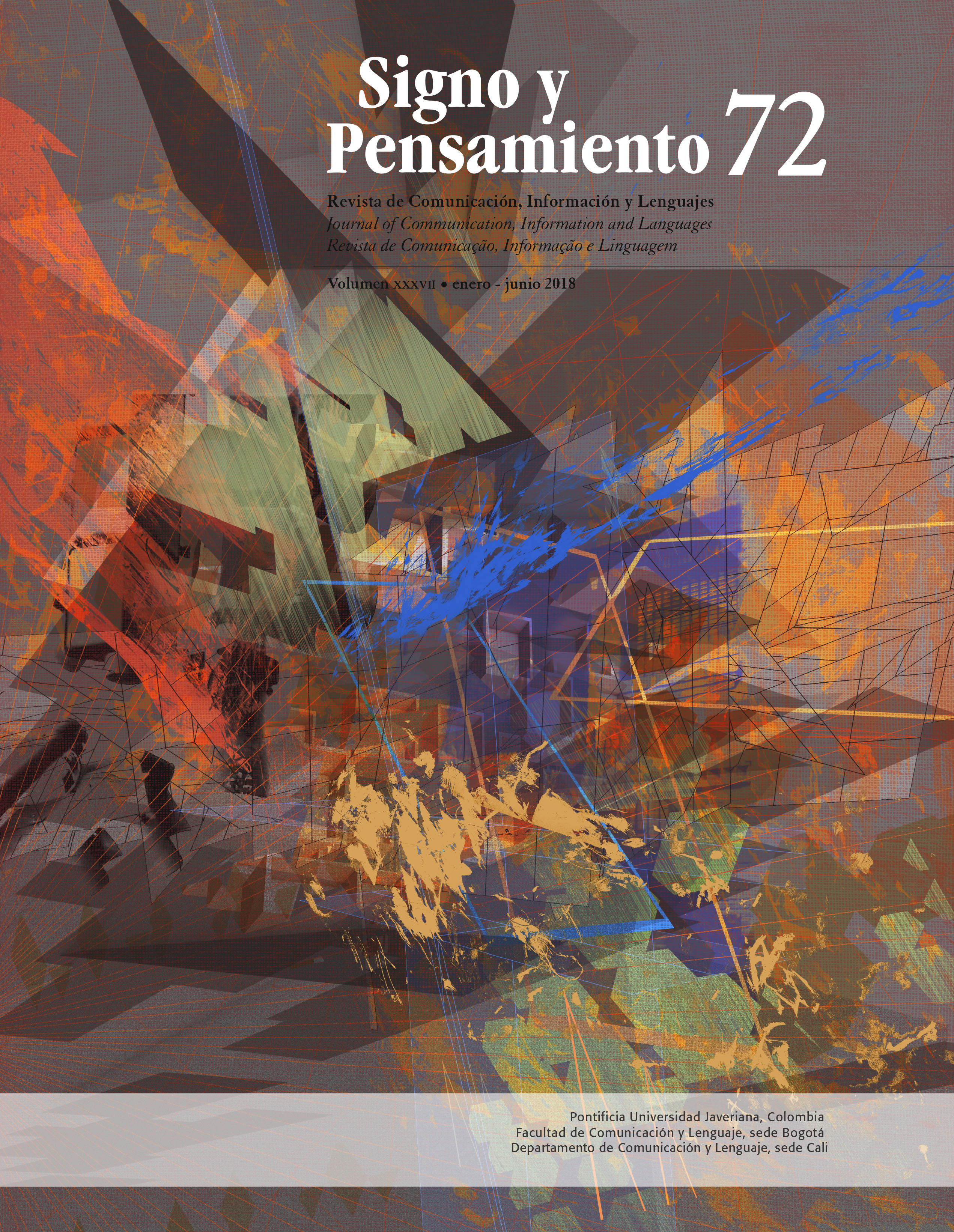Abstract
This article presents a reflection on the role that could meet the programs and faculties of communication in Latin America in the construction of visions not hegemony of the communication to enroll the theories produced in the continent as perspectives central to their curricula and Research. This proposal includes three key points: 1) "Decolonizar the know" to consolidate a point of enunciation where we cease to be the "other" for ourselves. 2) Construct a citizenship guarantor of political projects that advocate the solidarity and equity. 3) Carry out the tasks and challenges facing this task emancipatory, starting with the appropriation auto-valued of our contributions to the field.
Beltrán, L.R., Herrera, K., Pinto, E., & Torrico, E. (2008) La comunicación antes de Colón. Tipos y formas en Mesoamérica y los Andes. La Paz: CIBEC.
Castro-Gómez, S. (2007). Decolonizar la universidad. La hybris del punto cero y el diálogo de saberes. En Castro-Gómez, S. Grosfoguel, R (Eds). El giro decolonial: reflexiones para una diversidad epistémica más allá del capitalismo global (pp. 79-92). Bogotá: Siglo del Hombre Editores.
Farrés D. Y. & Matarán R. A. (2014). Hacia una teoría urbana transmoderna y decolonial: Una introducción. Polis, 13(37), 339-361. https://doi.org/10.4067/S0718-65682014000100019
Geerts, A. & van Oeyen, V. (2001) La radio popular frente al nuevo siglo: estudio de vigencia e incidencia. Quito: ALER.
Grosfoguel, Ramón (s.f) La Descolonización de la Economía Política y los Estudios Postcoloniales. Transmodernidad, pensamiento fronterizo y colonialidad global. Recuperado en: http://www.decolonialtranslation.com/espanol/transmodernidad-pensamiento-fronterizo-y-colonialidad-global.html
Lora Cam, J. & Recéndez, C. (2003). La universidad neoliberal y la crisis educativa. De cómo año tras año llegaron las evaluaciones. Reflexión Política, 5(10), 70-79. Recuperado de https://revistas.unab.edu.co/index.php/reflexion/article/view/701
Maldonado-Torres, N. (2008). La colonización y el giro-descolonial. Tabula Rasa, (9), 61-72. Recuperado de http://www.scielo.org.co/pdf/tara/n9/n9a05.pdf
Mignolo, W. (1995). The darker side of the Renaissance, 2 edición. Ann Arbor: Literacy, Territoriality, and Colonization.
Mignolo, W. (2007). El pensamiento decolonial. Desprendimiento y apertura. Un manifiesto. En: Castro-Gómez, S. Grosfoguel, R (Editores). El giro decolonial: reflexiones para una diversidad epistémica más allá del capitalismo global (pp. 25-46). Bogotá: Siglo del Hombre Editores.
Mignolo, W.(2007). Delinking, The rhetoric of Modernity. The Logic of Coloniality and the Grammar of decoloniality. Cultural Studies, 21(2-3), 449-514. https://doi.org/10.1080/09502380601162647
Quintero, M. M. (s.f.) Colonialidad del ser, delimitaciones conceptuales. Recuperado de http://www.cecies.org/articulo.asp?id=226
Quiroz, M. T. (2015) Mirada crítica a la investigación universitaria. Memorias Felafacs, Ponencias Eje temático 3.
Sierra Caballero, F. (2014). Comunicología del sur. Hacia una nueva geopolítica del conocimiento. Redes, (10), 8-17. https://doi.org/10.15213/redes.n10.p8
Sousa Santos, B. (1998). De la mano de Alicia. Lo social y lo político en la postmodernidad. Bogotá: Siglo del Hombre Editores, Ediciones Uniandes.
Torres, R. M. (2015, Julio). La Pluriversidad ‘Amawtay Wasi’ (Ecuador) [weblog comment]. Recuperado de http://otra-educacion.blogspot.com.co/2015/07/la-pluriversidad-amawtay-wasi-ecuador.html
Walsh, C. (2007). Interculturalidad y colonialidad del poder. Un pensamiento y posicionamiento “otro” desde la diferencia colonial. En Castro-Gómez, S. Grosfoguel, R (Eds). El giro decolonial: reflexiones para una diversidad epistémica más allá del capitalismo global (pp. 47-62). Bogotá: Siglo del Hombre Editores.
This journal is registered under a Creative Commons Attribution 4.0 International Public License. Thus, this work may be reproduced, distributed, and publicly shared in digital format, as long as the names of the authors and Pontificia Universidad Javeriana are acknowledged. Others are allowed to quote, adapt, transform, auto-archive, republish, and create based on this material, for any purpose (even commercial ones), provided the authorship is duly acknowledged, a link to the original work is provided, and it is specified if changes have been made. Pontificia Universidad Javeriana does not hold the rights of published works and the authors are solely responsible for the contents of their works; they keep the moral, intellectual, privacy, and publicity rights.
Approving the intervention of the work (review, copy-editing, translation, layout) and the following outreach, are granted through an use license and not through an assignment of rights. This means the journal and Pontificia Universidad Javeriana cannot be held responsible for any ethical malpractice by the authors. As a consequence of the protection granted by the use license, the journal is not required to publish recantations or modify information already published, unless the errata stems from the editorial management process. Publishing contents in this journal does not generate royalties for contributors.



